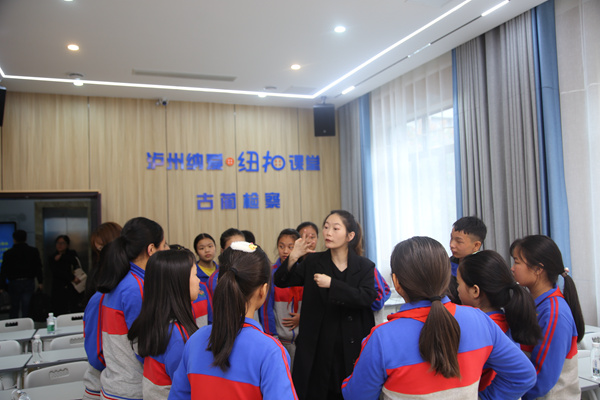

In 2012, Tang became one of the country's first lawyers to master sign language in a bid to provide legal services to hearing-impaired people. Tang's story deeply moved Tan and inspired her to apply for a job as Tang's assistant.
In 2017, Tang recruited five college graduates with hearing disabilities, including Tan. Among them, he hoped, would be the country's first hearing-impaired lawyer.
The job opened a new chapter for Tan, who has met and communicated with people from various walks of life, most of whom had some type of hearing impairment, for legal consultation. At first, however, her lack of basic legal knowledge meant that Tan could do little to help them.
"Under Tang's guidance, I came up with the idea to study law, to better help these people to know and protect their rights," Tan says.
She wants to be a lawyer to empower the hearing-impaired community and enable them to be seen, and heard. The first step in achieving that goal is passing the national bar exam, which has an estimated pass rate of 17 percent, according to this year's exam data released by the Ministry of Justice.
Her preparation for the test lasted for more than 1,000 days, which, she says, was "one of the hardest things" she has faced. Most people have to watch lots of video lecture material before sitting the exam, but for Tan, the added challenge was that she had to write down every character in the subtitles to understand the video. While people with hearing can master the knowledge of a video within hours, it would take Tan more than a week.
After failing the first two exams in 2018 and 2019, it all paid off last December. She became the country's first hearing-impaired person to pass the exam, according to China Central Television.
Bridge of communication
In Tang's eyes, it is not only an inspirational story, but a clear message that hearing-impaired people can, and should, have the opportunity to study law and be involved in the public legal service system.
"As far as I know, China doesn't have a college for hearing-impaired students to study law, nor medicine, which is a defect in our education system.... It means there is a lack of communication between the hearing-impaired and those with no hearing difficulties, leading to a gap in the legal and medical systems for the hearing-impaired," Tang was quoted saying in an interview with Beijing Youth Daily.
Tan is proof that this does not have to be the norm.
As a hearing-impaired person herself, Tan knows how difficult it is for such people to get involved in society, but her job makes her realize how much tougher a task they face.
"I found that, at most of the consultancies, the clients had low levels of literacy and education, and knew little about the legal system. However, they all have one thing in common-they use natural sign language, which is different from the standardized Chinese sign language," Tan says.
If we take the Chinese sign language as Mandarin, natural sign language is similar to a dialect. There are many differences in grammatical structure and hand gestures between the two. A survey, quoted by scientific knowledge resource provider Guokr, shows that about 10 percent of hearing-impaired adults in China use Chinese sign language.
Tan learned standard Chinese sign language at school, but she was unable, at first, to understand natural sign language.
That was the first time when she realized that there are communication barriers even among people with hearing difficulty. During her daily work, she uses natural sign language to enable smooth communication with clients.
At the same time, Tan also tries to learn to speak. People who lose their hearing later in life can learn to speak, but their speech may sound a bit different, because they cannot hear their own voice.
Her middle school teacher once told her that she would be the bridge between people with hearing difficulties and those who can hear clearly.
With every obstacle she overcomes on her journey to become China's first hearing-impaired lawyer, she lays another brick in its foundations.